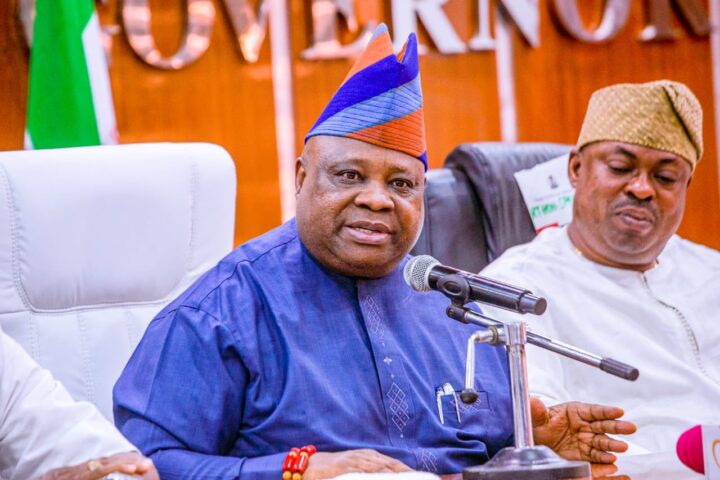The Niger Delta Development Commission (NDDC) has onboarded host communities in Akwa Ibom, Bayelsa and Rivers States for the agricultural specimen program, under the Holistic Opportunities and Programs for Empowerment (HOPE).
The exercise was carried out at the Corporate Headquarters of the Commission by the Managing Director and Chief Executive Officer of NDDC, Chief Samuel Ogbuku and also had in attendance the Executive Director, Finance and Administration (EDFA), Chief Boma Iyaye; Executive Director, Projects, Sir Victor Etim Antai; directors, staff of the commission, traditional rulers, stakeholders, and representatives of the host communities for the agricultural program.
The opening remark was given by the Executive Director Projects, who is also the chairman of the Project HOPE committee in the Niger Delta Development Commission, Sir Victor Etim Antai.
Antai said, “Project HOPE is a signature project in the Niger Delta Region. Project HOPE is the hope for the Niger Delta to identify the teeming youths, empower the youths, and is aimed at changing the tenor of militancy to a more respectable tenor of technology. The man behind it is the Managing Director, Dr. Samuel Ogbuku. We are here together because we have a lead consultant who is translating the dreams of the Managing Director for the youths and people of the region.”
He thanked the traditional rulers and stakeholders for keying into the vision of Project HOPE, stressing the idea of the agricultural specimen is to make the region self-reliant, especially regarding food production and provision. He also informed that the Rivers Farmers Association has already met with the commission, explaining that other areas of the country need irrigation for rice production, but the Niger Delta doesn’t need irrigation as there’s enough water. He finally promised that the commission will not fail the communities in any way.
Ambassador Blessing Fubara, the lead consultant for Project HOPE, in his speech thanked the Managing Director and the 7th Board for the birth of the project.
He said, “The communities are here today, and they have set an example to show that as communities, they are ready to be developed. MD sir, we carried out your directives, which is to translate from transaction to transformation, and the communities gave us hectares of land. Each community has seeded their lands and given us these lands for free with no dime paid.”
He further said, “For us to develop the communities, we need to engage in public, private, and community partnerships, as they will be stakeholders in the project. The children of the communities will be part of the management of the farms. We have promised that we will start planting with the rainy season, and with the permission of the MD, we will meet up with planning in due time to ensure we harvest also in due time.”
Traditional rulers and stakeholders from the various states gave goodwill messages and remarks from their respective communities, thanking the Managing Director and other members of the 7th Board for ” not taking the bull by the horns but rather by the teeth .” They assured the commission of security and all the necessary support from their communities, stating that they have even above the required 100 hectares.
The Managing Director and Chief Executive Officer, Dr. Samuel Ogbuku, in his remark, began by thanking the lead consultant for going to the field on behalf of the commission. He also thanked the Executive Director, Projects, and the other members of the Project HOPE committee for working around the clock to ensure the project is actualized. He said, “Project HOPE is born out of the renowned hope agenda of President Asiwaju Bola Ahmed Tinubu. What we are doing is creating sustainability. We know in the past so many projects have been done and abandoned. Food security is one vital instrument in the society that feeds our people and reduces social restiveness. In the past, we have tried to do all we can to ensure we empower youths and women of our region with little or no success. That is why we went back to the drawing board to have the Holistic Opportunities and Programs for Engagement. Development should not be only infrastructural; there’s a need to create a balance between infrastructural and human capital as well as other types of development. Once we can sort the basics, our region will develop rapidly.”
Chief Ogbuku reiterated that the commission wants the rural communities to be engaged to ensure they produce enough for the region.
He further said, “The essence of this partnership is to ensure you’re not spectators to development but partners in development. For anyone to benefit from the program of engagement, the youths need to register in the Project HOPE database. With the database, we will know and pick people based on their areas of competence and interest, so we can put square pegs in square holes to ensure we don’t make mistakes. Everything about Project HOPE is properly structured to move on auto-pilot. We want the database so that at the end of the day, we can know how many we have engaged and be accountable for the youths of our region. The state reps and officers are carried along, so if you cannot reach us, reach the state offices for any information or enquiry. Project HOPE will ensure we work with our Triple T, which is Transition from Transaction to Transformation. Project HOPE is bringing hope to the people of the Niger Delta. Let me thank you for being magnanimous enough to donate your lands. I assure you that we will be transparent, and we will not disappoint. For the fact that you donated your lands, when we have projects, we will give you preference.”
The proof of the onboarding exercise was the presentation of documents for the seeded lands by the communities to the Managing Director of NDDC, Ogbuku.





